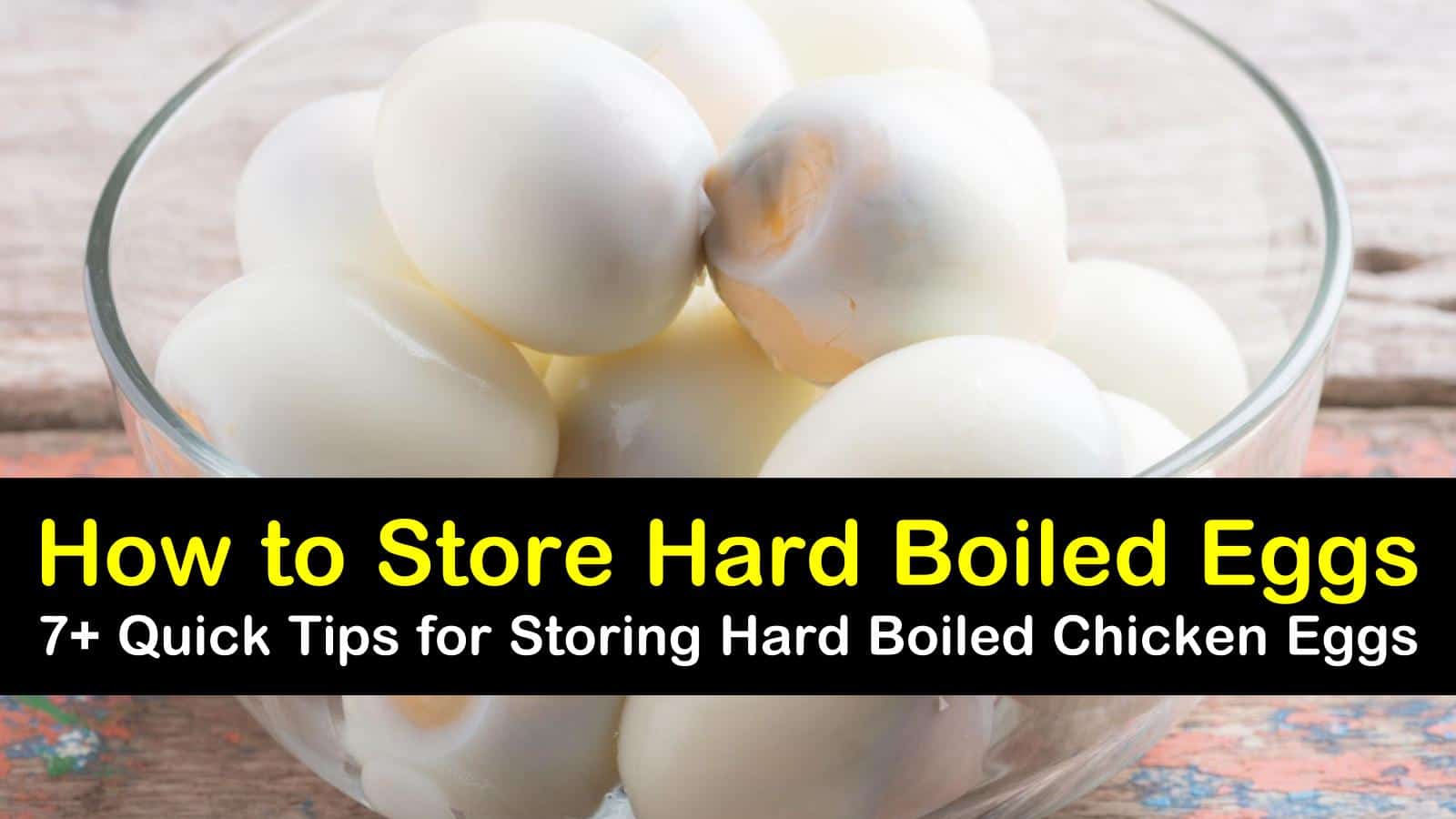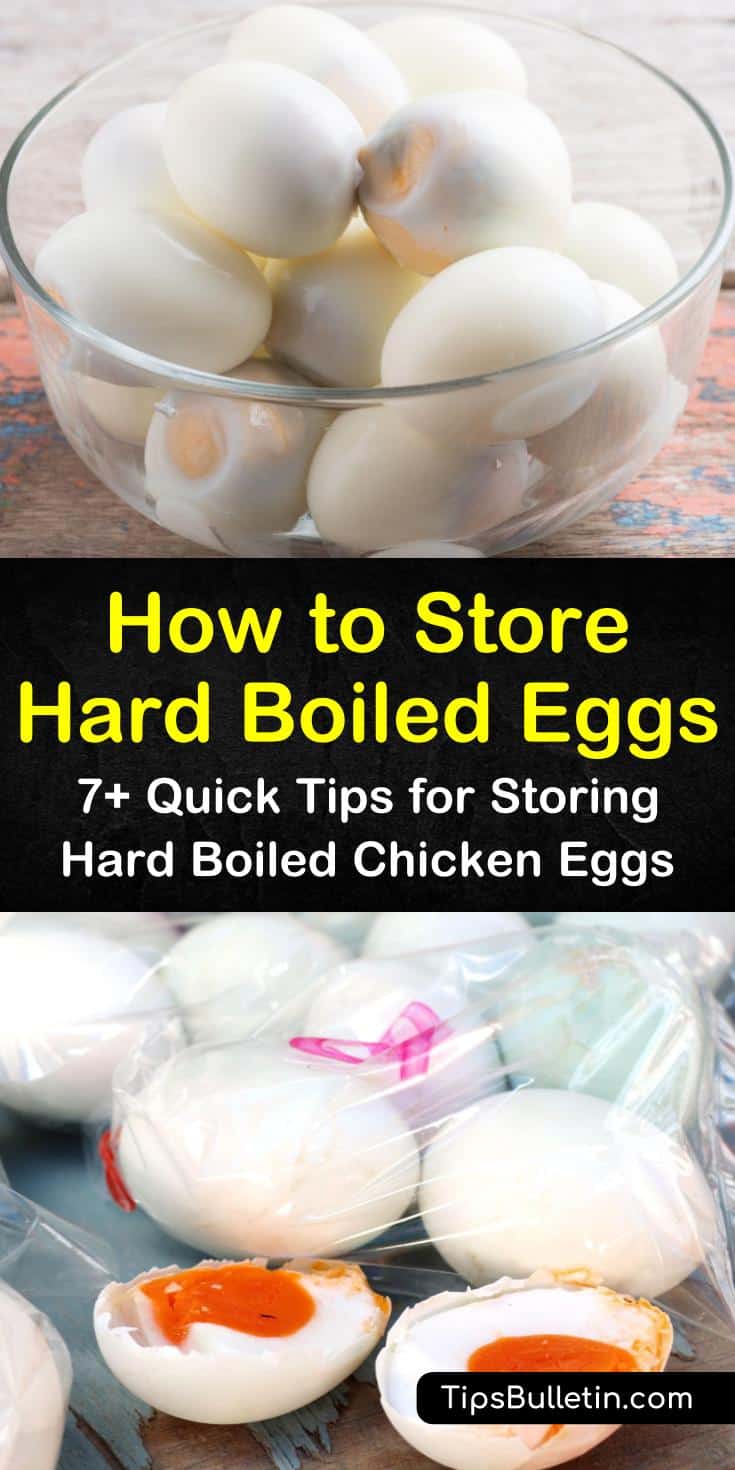Almost everybody loves hard-boiled eggs, as they are easy to cook, and they provide your body with protein. Learning how to boil eggs is simple, but the tricky part comes in when learning how to store hard-boiled eggs. This part is challenging because everybody has their ideas on saving hard-boiled eggs.
Some people think the best way to store hard boiled eggs is by peeling them and putting them inside the fridge, so you have them ready at all times. Others feel the best approach is to store them inside the refrigerator with their shells on.
The good news is when it comes to storing your hard-boiled eggs, everybody agrees the best place is inside the refrigerator. Avoid storing hard boiled eggs in the door or on an outside shelf.

Quick Tips for Storing Hard-Boiled Eggs
When possible, store hard boiled eggs at the back inside their original egg carton. This storage method protects the eggs from temperature fluctuations as doors repeatedly open and close throughout the day. Make sure you are preparing and storing your cooked eggs correctly, so you have the chance to enjoy them before they go bad.
When you preserve eggs in your favorite way it’s easier to grab one on the go as a healthy snack. However, one thing you may notice as you store your hard boiled eggs inside the fridge is a gassy odor. Many people assume this means the eggs are rotten, but that is far from it.
The smell is caused by hydrogen sulfide when the eggs cook, and as you may have discovered, the smell goes away within a few hours of placing the hard-boiled eggs inside the fridge.
Keep Hard Boiled Eggs Fresh
How long are hard boiled eggs good for? As with any type of food, it depends on how they are stored. While knowing how to store hard-boiled eggs correctly is essential, what makes a more significant difference is the quality of the egg before you boil it.
Start with the best ones from the beginning. These eggs allow for the perfect hard-boiled egg, one with no green ring around the yolk, and as you bite into them, you will notice their creamy texture.

Whether you need to know how long to boil eggs for egg salad or deviled eggs, achieving the perfect egg is all about cooking time and choosing the best eggs for boiling.
Strangely enough, don’t be tempted to use the freshest eggs when making hard-boiled eggs; always opt for eggs that are at least three to five days old. Once boiled, raw eggs are tough to peel as the whites of the egg are not mature.
Farm fresh eggs are also challenging to peel, so they are not a good option either. When determining how old the eggs are, do not go by the sell-by date, as the eggs are often laid at various times; instead, opt for a water test. The perfect eggs for hard-boiled eggs are the ones that are close to standing up inside the water.
When placed in a bowl of water, if the egg lies on its side, it is fresh. As the egg ages, the air pocket inside also grows, allowing the egg to start standing up. Eggs that float to the top of the water are spoiled. Always bring eggs to room temperature before cooking, as there is a lower chance of cracking in hot water.
Only place a single layer of eggs on the bottom of the pan and cover with enough water to completely submerge the eggs. Remove the pan of eggs from heat as soon as the water begins to boil, cover with a lid, and cook large eggs for 19 minutes. To halt the cooking process, place eggs in a bowl of ice cubes and cold water.
Store Hard Boiled Eggs
One frequent question asked is, how long do hard boiled eggs last? The short answer is that hard boiled eggs last for up to one week when stored in the refrigerator. The ideal egg storage temperature is 45°F or below. Interesting to note is that with proper food storage guidelines followed, raw eggs have a longer shelf life than cooked eggs.
Do hard boiled eggs need to be refrigerated? The answer is definitely, yes. Increased exposure to room temperatures or warmer can lead to food-borne illnesses that no one wants to experience.
Safely store hard boiled eggs inside the refrigerator for up to one week. The best way to save them is inside a covered container with their shells intact.
All hard-boiled eggs not consumed within a few hours require refrigeration. If left out at room temperatures for an extended period, such as buffets or picnics, discard eggs rather than placing them back inside the refrigerator.
Best Way to Store Hard Boiled Eggs When Peeled
It is not recommended, but you can peel and store hard boiled eggs inside the fridge. How you store peeled eggs is different from unpeeled eggs. When storing peeled eggs, it is essential to keep them moist.
Store peeled eggs in a covered bowl of cold water for up to one week but change the water daily. The other storage option is inside a sealed container with a damp paper towel covering them to keep eggs moist. Some recommend only covering the eggs with the paper towel, while others place wet paper towels on the bottom and top of the peeled eggs.
Storing Boiled Eggs Outside
Sometimes you need to store eggs for an outdoor function. Most people prefer to keep their eggs refrigerator cold for freshness, but also the best taste. For outside events, use a commercial coolant or some ice along with an insulated bag or an ice chest. The combination of these products will keep your eggs the perfect temperature for hours.
If outside longer than four hours, check on the ice or coolant levels to see if they require replenishing. If you plan to bring hard-boiled eggs camping, do not peel them beforehand. Leave the egg shells on.
Along with an insulated cooler or ice chest, store all cooked eggs, including deviled eggs, in the shade. Only bring out a small number of eggs to serve at a time. Open the cooler or insulated bag as little as possible to help keep the temperature at or below 40°F as recommended by the USDA.
Can I Freeze Hard Boiled Eggs?
You cannot freeze whole hard-boiled eggs as egg whites turn tough and become watery once thawed. When freezing the hard-boiled yolks, it is best to boil the yolks hard separately. To do this, separate the yolks and place them inside a small pan. Cover the yolks with one inch of water and bring to a boil.
Immediately remove the pan from the burner, cover with a lid, and allow to stand for 12 minutes in hot water. Gently remove the cooked yolks from the water with a slotted spoon. Drain them and prepare them for freezing in airtight containers or freezer bags.
Safely store frozen hard-boiled egg yolks inside a freezer for up to one year. To use the frozen yolks, remove them from the freezer and allow them to thaw. Thaw the frozen egg yolks under cold running water or in the fridge overnight. Never place them on the counter to thaw at room temperature.
You can freeze most dairy products with excellent results. Freezing mozzarella is just as simple as freezing hard-boiled egg yolks or milk. It just takes a little preparation.
Best Way to Pickle Hard-Boiled Eggs
While we no longer need to pickle eggs for preservation, many of us still find pickled eggs a yummy treat. One of the great things about pickled eggs is you can serve them as an appetizer, or you can chop them up and turn them into egg salad.
Add vinegar, water, salt, onion, bay leaf, sugar, and pickling spice to a pan and bring to a boil. Cook at a simmer for five minutes and allow to slightly cool. In a jar, add the garlic clove and three eggs.
Top the eggs with some onion and a dill sprig. Repeat these layers until the jar is full. Pour the liquid over the eggs and close the jar. Place pickled eggs inside the fridge for up to one week before serving for the best taste.
Using Hard Boiled Eggs
One way to use hard boiled eggs is by making egg salad sandwiches. Chop up the eggs, stir in a little mayo, celery, and a squirt of lemon juice and you are ready to go. Serve between two slices of sandwich bread. To help cut down on the carbs, serve it on flatbread, pita bread, or eat it from the bowl.
For an exciting flavor variation, mix some mashed avocados with a small amount of mayo and then add your chopped eggs. The flavor combinations are endless; check out some of the recipes on Food & Wine if you need inspiration.
Keep egg salad fresh in the fridge for a couple of days after you make it – if it lasts that long!
Cooking and Coloring Eggs for Easter
If you plan to cook and color eggs as part of your Easter festivities, you want to do so safely. According to the American Egg Board, color eggs immediately after cooling. If you plan to color eggs at a later time, refrigerate the cooled eggs immediately.
Inspect all cooked eggs for cracked shells, discard or set aside cracked eggs for different uses, never color the cracked ones. If eggs cracking during coloring or are out of the refrigerator for more than two hours, throw the eggs away as they are not safe for consumption. When conducting an egg hunt, do not exceed the two-hour time limit.

Thank you for reading our tips on storing hard-boiled eggs. If you feel any of our tips offer the best way to store hard-boiled eggs, please share our storage tips on Pinterest and Facebook so others can learn how to store hard-boiled eggs correctly.